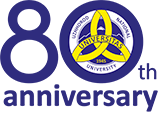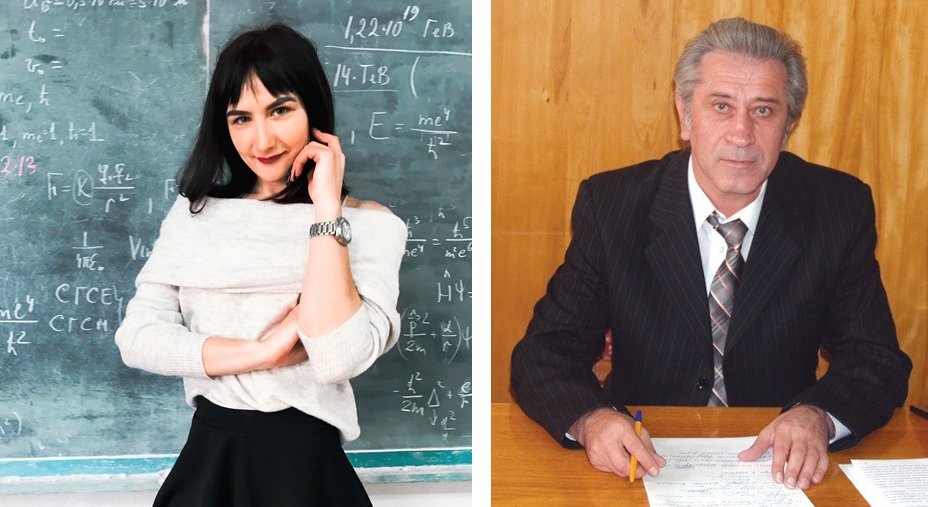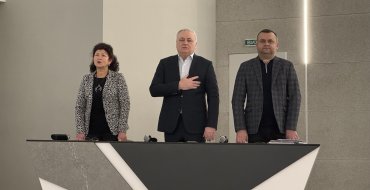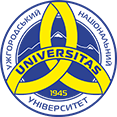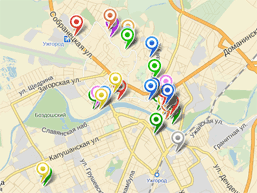Coffee with the dean / coffee with a student: top 5 reasons to enter the Faculty of Physics
It is Tuesday today, so it's high time for our traditional column! We are having virtual coffee chats to find out the benefits of entering the Faculty ot Physics of Uzhhorod National University from the dean, Doctor of Physics and Mathematics, Professor Volodymyr Lazur and a student Svitlana Kuzma.
Svitlana Kuzma, a student:
1. In my opinion, the modern world will not be able to do without physicists, so a graduate of our faculty will easily find his/her place. There are many promising specialties at the Faculty of Physics, and the entrant will be able to choose a specialty to his/her liking.
2. Our graduates will definitely be able to get a decent job in the field of programming and modern technologies. Students of the Faculty of Physics are engaged in creating applications, robotics, experiments and research.
3. There’s a vibrant student life at our faculty. After classes we have a lot of active leisure actiities. We organize many interesting events, such as Archimedes Days, Miss and Mr. Faculty, Bograch-Fest, ski trips, hiking, as well as many sporting events, charity tournaments, which are attended by both students and teachers.
4. We have wonderful teachers. These people are role models for us. They are always happy to help, give advice and listen to a student if he/she has any questions.
5. A big advantage is that we have the opportunity to continue our studies at the postgraduate courses both at UzhNU and abroad.
Volodymyr Lazur, the Dean:
1. A dignified future of humankind is closely linked to the progress of physics. The 20th century was certainly the century of physics: lasers, masers, x-rays, atomic energy, computers, the World Wide Web, and much more came into the world with the discoveries of physicists. I am deeply convinced that in the 21st century physics will be incomparably more important for both science and society. This is due to the very structure of physics as a science. Knowledge of the logic of nature is important not only for physicists, it is necessary for all branches of human activity. In the 21st century, humanity and physicists, in particular, face a number of global challenges, such as controlled thermonuclear fusion, a new generation of accelerators, high-energy physics, dark matter and dark energy, quantum computers and artificial intelligence, creation of new semiconductor substances with predetermined physical properties, study of the fundamental properties and structure of matter and the evolution of the universe from the moment of its birth, new space research programmes, global environmental monitoring. Global problems also include the depletion of natural resources, environmental pollution, deadly diseases, anthropogenic climate change. The natural sciences, which make extensive use of physical research methods, should play a crucial role in solving the problems listed above. These and many other problems of modern physics can not but interest the ambitious modern youth. I would like to say to the young people who have decided to link their professional activities with physics, that they have chosen a wonderful sphere related to learning amazing secrets of nature. Its important for them, first of all, to have faith in their strength, be determined and persistent, and then, sooner or later, success will surely come. Science is so fascinating that each new step in the process of gaining knowledge can lead to unexpected innovations that can change the fate of all humankind for the better.
2. It is prestigious and honourable to study at the Faculty of Physics of Uzhhorod National University. Here you can get a high quality higher education of international level, work on modern high-tech equipment, listen to lectures by famous physicists, many of whom are world-renowned and are actively working in science now. The faculty trains highly qualified specialists in the following specialties:
- Secondary education. Physics;
- Physics and astronomy;
- Applied physics and nanomaterials;
- Micro- and nanosystem technology;
- Cybersecurity;
- Telecommunications and radio engineering;
- Biomedical engineering.
The educational process at the Faculty of Physics is provided by 20 Professors, Doctors of Sciences and 49 Associate Professors, Candidates of Sciences, including one Corresponding Member of the NAS of Ukraine, three laureates of the State Prize of Ukraine in Science and Technology, five Honoured Workers of Science and Technology of Ukraine, an Honoured Worker of Education of Ukraine and two Honored Inventors of Ukraine. Highly qualified employees of the Research Institute of Solid State Physics and Chemistry and the Institute of Electronic Physics of the National Academy of Sciences of Ukraine are also engaged as teachers. Proper material and technical facilities facilitate successful educational process and research work performed by students. These are, first of all, the laboratories supplied with modern experimental and computer equipment and a computer lab.
The best alumni of the faculty have the opportunity to continue their studies at the postgraduate courses, which operate at all faculty departments and are the largest at Uzhhorod National University. Every year about 35 full-time and part-time postgraduate students work on their theses here. The functioning of the Specialized Academic Council for the Defense of Doctoral and Candidate's Dissertations also contributes to the training of highly qualified specialists. It is quite natural that more than 150 alumni of the faculty became Doctors, and four hundred - Candidates of Physics and Mathematics. They include citizens of Slovenia, Croatia, Serbia, Bulgaria, Slovakia, Hungary, Syria, Iraq, the United States and Israel.
3. The publications of the Faculty of Physics staff members in the international journals indexed in scientometric Scopus and Web of Science databases, Hirsch index, citations of their works, the number of copyright certificates for inventions, the number of government funded topics and technical projects are the evidence of the scientific achievements. Nationwide, we work closely with all key universities and leading research centers in the world. Within the framework of the international scientific programmes for the support of basic research (IAEA, EUROATOM) and joint grants from INTAS, NATO, Copernicus, Horizon-2020, scientists of the faculty together with their foreign colleagues have implemented 17 research projects on controlled thermonuclear fusion, atomic physics, physics of semiconductors and astrophysics. More than 30 joint international research projects have been implemented in collaboration with the scientists from France, India, Hungary, Bulgaria, Slovakia, Lithuania, Turkey, and Belarus. Undergraduate students are also involved in the implementation of these projects. Scientific cooperation of the Faculty of Physics with leading foreign research centers is the basis for our integration into the world academic environment and the scientific community.
4. The Faculty of Physics of UzhNU has proper material and technical facilities. These are, first of all, scientific laboratories of electron microscopy, X-ray diffraction analysis, high pressures, low temperatures, and laser physics supplied with modern experimental and computer equipment. Local physicists have a unique accelerating complex of electrons (microtron M-10 and betatron B-25 at 10 MeV and 25 MeV, respectively), an experimental installation "Karpaty" for the formation of electron beams, a modern complex for observing artificial Earth satellites, coordinate measuring machines KOMES and Axcorecord (produced by the German company Zeiss), SBG satellite photographic cameras, telescopes,and mass spectrometers at their disposal.
At the six faculty departments, one can get a classical fundamental education and conduct research in almost all modern areas of experimental and theoretical physics, atomic and nuclear physics, astronomy and astrophysics, optics and spectroscopy, laser physics and surface phenomena, plasma physics and phase transition physics, etc. At the same time, some undergraduate students conduct research at the branches of our faculty departments, which successfully operate on the basis of the relevant departments of the Institute of Electronic Physics of the National Academy of Sciences of Ukraine (Uzhhorod).
The Faculty of Physics also includes the Research Institute of Solid State Physics and Chemistry, the Problem Research Laboratory of Physical Electronics, the Space Research Laboratory and the Research Institute of Analytical Engineering. In September 2019, according to the order of the Ministry of Education and Science of Ukraine, UzhNU established the Center for Joint Use of Scientific Equipment – the Laboratory of Experimental and Applied Physics whose main task is to obtain results of research and scientific and technical developments of national importance and international recognition. Unique experimental devices and equipment have been purchased for the center at the expense of the governmental budget. These are Smart SE spectral ellipsometer, Shimadzu UV-2600 two-beam electrophotometer, UV-1700 two-beam scanning spectrophotometer, dual channel spectrometer with astigmatism compensation SL40-2-1024USB, precision meter LCR E4980A, planetary ball mill PQ-N04, SIGLENT SDM3065X precision digital multimeter, SIGLENT SDS1202X phosphor digital oscilloscope, OWON xDS3062A digital oscilloscope, SIGLENTSDG6022X signal generator and OWON digital multimeter. Students have the opportunity to conduct their research using this modern scientific equipment. Therefore, it is not surprising that every third graduate of the Faculty of Physics has one or more publications in domestic and international journals, materials of the national and international scientific conferences. Students of Physics are co-authors in copyright certificates for inventions.
5. The doors of the most prestigious academic research institutions, leading universities and secondary schools, design bureaus, research, production and computer centers, enterprises and organizations engaged in the development of information transmission and protection systems are open for the graduates of the Faculty of Physics of Uzhhorod National University. Our undergraduates are invited to work at the enterprises of the region, such as "Jabil Circuit Ukraine Ltd", PJSC "Eurocar", "Fischer-Mukachevo ltd", "Yazaki Ukraine", LLC "Flexstroniks" and others. Our alumni successfully work in other fields, such as healthcare, ecology, economics, finance, business, management, customs service, law enforcement agencies, etc.
A lot of alumni of the Faculty of Physics of Uzhhorod National University successfully work in the scientific institutions of Ukraine and abroad. Yuriy Baleha is the Vice-President of the Russian Academy of Sciences is an alumnus of the Faculty of Physics of Uzhhorod National University, Academician of the Russian Academy of Sciences. Professor Yuliy Yelinek, an alumnus of the Department of Theoretical Physics of Uzhhorod National University, works in one of the largest laboratories in the world - the Argonne National Laboratory (Chicago, USA). The Standards and Frequencies Department of the National Physics Laboratory of Israel is headed by Nadia Goldovska. Viktor Goldovsky is a scientific advisor to the Plasma Spectroscopy Laboratory at the Weizmann Institute (Israel). The Institute of Solid State Physics (Julikh, Germany) employs graduates of the Department of Semiconductor Physics K. Rushchansky and his wife I. Slipukhina. Taras Chutora is a doctoral student of the Institute of Physics of the Czech Academy of Sciences. Roman Selyanchyn works at Kyushu University (Japan). Dmytro Symochko works at the Nuclear Physics Institute of the Technical University of Darmstadt (Germany), where the construction of the ultra-modern multi-purpose accelerator complex FAIR will be completed this year. Yevhen Sherehiy works as a professor at the University of Rzeszow (Poland). Oleksandr Kikineshi works as a professor at the Department of Experimental Physics and Nanotechnologies of the University of Debrecen (Hungary). Denys Bondar, an alumnus of the Department of Theoretical Physics, works at Princeton University (New Jersey, USA), Yuriy Pylypchenko took part in an experiment at the Large Hadron Collider as part of the ATLAS collaboration, which for the first time registered the decay of the legendary Higgs boson into fundamental particles of matter known as bottom quarks. The Department of Solar Physics at the Main Astronomical Observatory of the National Academy of Sciences of Ukraine is headed by Roman Kostyk, an alumnus of the Physics Department of Uzhhorod National University and a corresponding member of the National Academy of Sciences of Ukraine. Oleksandr Havrylyk, an alumnus of the Department of Theoretical Physics of Uzhhorod National University, Doctor of Physics and Mathematics is the head of the Department of Mathematical Methods in Theoretical Physics at Bogolyubov Institute of Theoretical Physics (Kyiv).
The list of our successful alumni can be continued, but the most important thing here is that the Physics Faculty of Uzhhorod National University provides a high level of training. Our graduates who work for international and domestic research centers, as a rule, hold responsible posts there, and we receive only positive feedback about their scientific work from our foreign colleagues.
